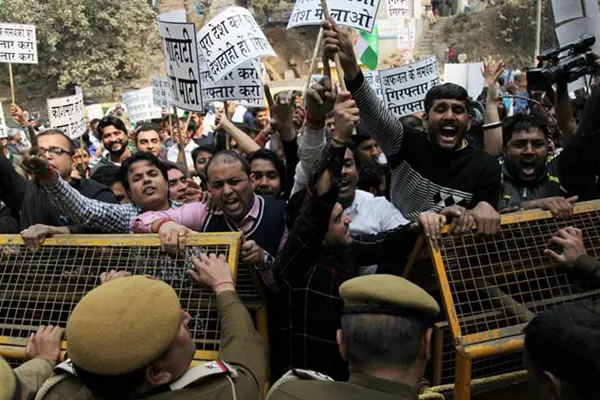University authorities at India' s prestigious Jawaharlal Nehru University (JNU) have rusticated three students and fined many others including their union president for organizing a protest inside campus in February where "anti-national" slogans were allegedly raised, officials said Tuesday.
The rusticated students include Umar Khalid, Anirban Bhhatacharya and Mujeeb Gattoo.
"Umar has been rusticated for one semester, Anirban Bhattacharya till July 15 and Mujeeb Gattoo for two semesters," officials said. "A fine of 150 U.S. dollars (INR 10,000) has been imposed upon JNU student union president Kanhaiya Kumar."
The university has also withdrawn hostel facilities for Ashutosh Kumar for a period of one year and Komal Mohite for three months. Many other students have also been fined.
Kumar, Khalid and Bhhatacharya were arrested on "sedition charges" and later released on bail.
Bhattacharya has been given nine days to submit his PHD thesis, and has been rusticated till July 15, followed by a five-year bar on entering the campus.
Besides, he along with Khalid has been fined with 300 U.S. dollars each.
The punishments to the students were recommended by a panel nominated by university to probe its students facing sedition charges and alleged shouting of "anti-national" slogans at an event organized in the campus in February to mark hanging anniversary of 2001 Indian parliament attack convict Mohammed Afzal Guru.
The student bodies however rejected the punishments handed over to the students and described it "vengeance."
"We completely reject this farcical inquiry report, as it is based on sheer vendetta and a biased inquiry. These are all innocent students, coming from extremely humble and underprivileged backgrounds. They are all dedicated activists and this is a conspiracy to crush anti-Modi voices," reads a statement issued by students body.
"Not only will we not remain silent against this anti-people government, we will also challenge this sham of a report."
Sedition as per Indian law amounts to inciting people to oppose their government. The maximum punishment for sedition in India is life imprisonment. The law dates back to 1870 and was introduced by the British during their time in India.
The arrest of university students had led to massive protests and clashes across India, besides generating a debate over "freedom of expression" in India at large.
Though the booking of university students under "sedition" and describing them "anti-nationals" have been opposed by many, the government refused to back down and vowed to punish them.
Guru, a Kashmiri was executed in 2013 at New Delhi's Tihar jail. Many in India and Indian-controlled Kashmir believe Guru was denied a fair trial.
India's former federal minister P Chidambaram also stated there were "grave doubts" about the involvement of Guru and that the case was "perhaps not correctly decided."
 简体中文
简体中文





